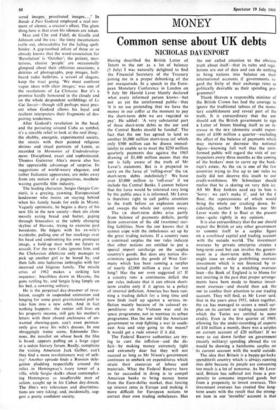Umbrella stand
PENELOPE HOUSTON
Le Gal Savoir (rcA, Nash House)
Memories of Underdevelopment (Paris- Pullman, 'X')
One hopes that the Cultural Revolut'on hasn't done for Jean-Luc Godard. His ex- traordinary hold as a film-maker—and the quality that has perhaps most maddened anyone not held—has been his sense of a sustained dialogue: filling the space between screen and audience, his chosen working area, with a flow of paradox, digression, re- verberating cross-question, conversations picked up from film to film. Lately, in One Plus One and now Le Gai Savoir, the prob- lem of how and why he does it seems to loom punishingly for him, like a man stag- gering because he's actually thinking about how he manages to keep walking and put- ting one foot in front of another; and the effect on communication is freezing. The corridor to the audience chokes up with a treacly sludge of jargon. And from some- where down his treacle well, Godard buzzes away, banging for attention with his copy of the Thoughts of Mao, or making a sortie to tells us we all ought to be making our own films anyway instead of watching his.
Le Gal Savoir was actually commissioned, in what would seem to have been a mom- ent of deranged optimism, by French tele- vision, and was made either side of the events of May 1968. (The Gaullist lackeys. in Godard's idiom, haven't shown it.) It opens with an encounter in a film-maker's primary-coloured limbo, between Jean- Pierre Leaud and Juliette Bert°. He's a des- cendant of Rousseau, she's 'the daughter of Lumumba and the Cultural Revolution', and arrives brandishing a transparent umbrella. ('Oh, e'est un parapluie anti-atomique."Otti, mais je in'en sers confute reflecteur de con- science.') Typical Godard stuff, with fav- oured Godard actors: capricious, ingrati- ating, already grating a little. The couple's proclaimed purpose is to investigate sound and image, question the assumptions, dis- solve, isolate, rearrange, connect. At a late stage in their interminable curriculum (crash course for the auto-university), they con- template a conclusion: 'c'est un peu le ?leant quand mane qu'on a decouvert, non?'
And it is un peu he neant because the film. posed as so open an inquiry, a discourse on method and search for definitions, grinds irreversibly into clotted, mind-sealing har- angue. 'One minute of silence for the little Black Panther beaten in San Francisco by the murderers of the Fai . . . One minute of silence for all the absent images, cen-
sored images, prostituted images....' In Bande a Part Godard employed a real mo- ment of silence; a creator's effect. The glum thing here is that even his silences are token.
Mao and Che and Fidel; de Gaulle and Johnson and the ciA: the tinny incantations rattle out, abracadabra for the failing spell- binder. A gap-toothed infant of three or so already knows that the word-association for 'Revolution' is 'October'; the patient, mys- terious, elusive 'people' are occasionally glimpsed about their oblivious occasions; a detritus of photographs, pop images, half- heard radio bulletins, a scrawl of slogans, keep the tract going. 'We must confront vague ideas with clear images,' was one of the resolutions of La Chinoise. But it's a promise hardly honoured in the cloudy and on the whole despondent scribblings of Le Gai Savoir—though still perhaps most pres- ent when Godard allows his loyal and resilient interpreters their fragments of des- pairing tenderness.
After Godard's revolution in the head, and the posturing around Cuba as symbol, it's a sizeable relief to look at the real thing: the shabby, energetic, experimental society, the streets with their painted religious shrines and ritual portraits of Lenin, as recorded in Memories of Underdevelop- ment. Disciplined, exact and sophisticated, Thomas Gutierrez Alea's movie also has the appreciable advantage of surprise. Its suggestions of world-weary elegance, and rather Italianate appearance, are miles away from any notion of a pugnacious, macbete- waving guerrilla film industry.
The leading character, Sergio (Sergio Cor- rieri), is a greying, yawning, Europeanised landowner who insists on staying behind when his family heads for exile in Miami. Vaguely optimistic, he begins a diary of his new life in the new society—then sits alone messily eating bread and butter, gaping through binoculars at the subtly changing skyline of Havana, trying to exorcise past boredoms. He fidgets with his ex-wife's wardrobe, pulling one of her stockings over his head and confronting his own grotesque image, a hold-up man with no future to assault. For the new Cuba ignores him, and the Chekovian dilettante only manages to pick up another girl to be bored by, and then falls into ludicrous imbroglio with her incensed and litigious family. The missile crisis of 1962 makes a striking last sequence: breathless dawn in Havana, the guns rattling by, and Sergio lying limply on his bed, a cowering solitary.
He is the perpetual day-dreamer of revo- lution, caught in suspended animation and longing for some great gravitational pull to take him into a new orbit. And in fact nothing happens: the rentier still lives on his property income, still gets his mother's letters with their absurd enclosures of un- wanted chewing-gum, can't even perman- ently give away his wife's dresses. In one shruggingly ironic scene, Edmundo Des- noes, the novelist on whose book the film is based, appears puffing on a large cigar at a sedate literary forum. Really, complains the visiting American Jack Gelber, can't they find a more revolutionary way of talk- ing? Another episode finds a Russian dele- gation plodding respectfully around the relics in Hemingway's ivory tower of a villa, while Sergio skulks about contemplat- ing Hemingway as insufferable man of action, caught up in his Cuban day-dream. The film's wry tolerances and discrimina- tions are very taking; and, incidentally, sug- gest a pretty confident society.



































 Previous page
Previous page